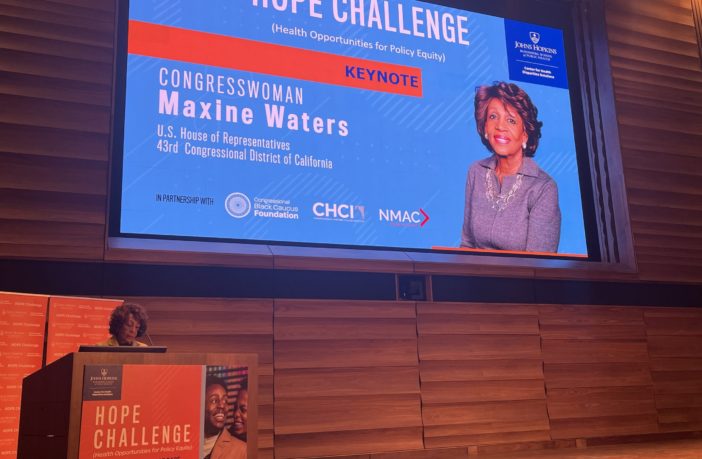By Ashleigh Fields
AFRO Assistant Editor
afields@afro.com
Congresswoman Maxine Waters (D-CA-43) observed the impact of her 25-year-old Minority AIDS Initiative at 25 through the lens of benefactors at the World AIDS Day Conference on Dec. 1. The initiative was established by Congress in 1998 with the objective to provide evidence-based treatment to HIV patients with primary care and prevention services for people of color.
Waters partnered with organizations aiming to eradicate health disparities for the day-long symposium at the John Hopkins Bloomberg Center. The conference included two panel discussions surrounding the correlation between race and access to quality healthcare.
“Black women account for more than half 55 percent of new HIV diagnoses among women. We’ve got to get more money. We’ve got to get more resources. We need more capital and it’s not going to come– we have to fight for it.”
“It is often true that one of the biggest barriers to equity is a lack of resources— especially when it comes to funding for programs that are designed to serve Black and Brown communities,” said panel participant Alphonso David, president and CEO of the Global Black Economic Forum. “When it comes to funding, it’s important to look for ways that both the public and private sectors can work together to provide sustainable support for programs…”
This sentiment was echoed by Waters, who served as the keynote speaker.
“Black women account for more than half 55 percent of new HIV diagnoses among women,” said Waters in relation to the HIV/AIDS epidemic. “We’ve got to get more money. We’ve got to get more resources. We need more capital and it’s not going to come–we have to fight for it.”
She cited the attacks seen in budget recommendations from the Republican-led House Appropriations Subcommittee that threaten the survival of entities serving people of color diagnosed with HIV/AIDS. If passed, the proposed recommendation could result in a 53 percent spending cut to the Minority AIDS Initiative in the Office of the Secretary. Funding for the Minority AIDS Initiative within SAMHSA and the Ryan White HIV AIDS Program would also be reduced affecting national education training centers.
“The cuts to the Minority AIDS Initiative will exacerbate racial disparities and the elimination of the ending of the HIV epidemic,” said Waters. “Minority led community based organizations to help them deliver in their capacity culturally. When we write and we talk, nobody understands us but us.”
She continued by highlighting Black leaders such as Archbishop Carl Bean of the Minority AIDS Project and Dr. Wilbert C. Jordan of Martin Luther King Jr. Community Hospital who educated her early on about the AIDS epidemic. Those inspired by their work and her words traveled to be in the audience.
“Maxine Waters just re-energized everybody in the room. I’m here in the room representing Black transgender men, because data shows that we are impacted by HIV as well, but we don’t receive much funding at all–we’re not at the table. I was happy to hear her say that we’re going to continue to fight for ‘money, money, money,’” said Elijah Nicholas, founder of 100 Black-Trans Men. “Our objective is to continue showing up in spaces like this, having a voice for Black transgender men and then building relationships within the community so that we can learn the process–learning the political process is a big part of the strategy of learning.”
Nicholas said the Black maternal mortality rate is one area that lacks statistical input from the Black-trans community.
“Black-trans men who are birthing parents also, fall into the Black maternal mortality rate, but we’re not at the table and we’re not a part of the discussion,” said Nicholas. “It’s my objective to get a seat at the table first and then begin to help organizations collect the data because there’s no real data on Black-trans men who are birthing parents and the mortality rate.”
Waters agreed and ended her speech by urging President Biden to provide more federal funding to organizations led by minorities.
“We’ve got to fight and we’ve got to fight dirty. That’s not a bad word, it’s a good word when you’re fighting dirty people,” said Waters. “We in the Black caucus, in the combined caucuses that’s in the House of Representatives, we’re going to be there on the front lines with you doing what I’m advocating in order to make sure we get America to do the right thing.”



